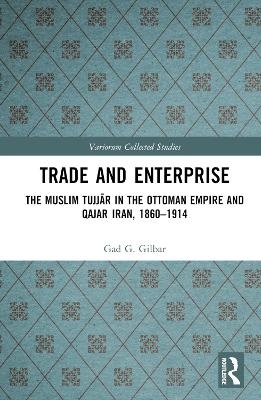
Trade and Enterprise
Routledge (Verlag)
978-1-032-01159-2 (ISBN)
Until recently, the historiography of Middle Eastern economic elites during the first globalization has ignored the significant role played by Muslim tujjār (big merchant-entrepreneurs). Foreign firms and local minorities were considered the prime agents of economic change and the initiators of economic growth.
The 12 studies in this volume show that the Muslim tujjār played a major economic role in various regions of the Middle East during the late nineteenth and early twentieth centuries. Their investments, mainly in commercial agriculture, resulted in economic growth and changed economic structures and social relations in many Middle Eastern communities. They were also involved in political developments, some of which had a dramatic effect on the history of their countries, as for instance in late Qajar Iran. They also played a unique role in the process of cultural change. Although they supported the ʿulamāʾ financially, they also contributed to the establishment of new educational and cultural institutions. The story of the tujjār is unique in the sense that it was the only indigenous elite group in the pre-World War I Middle East to bridge between traditional forces and concepts and Western attitudes and practices. (CS 1108).
Gad G. Gilbar is Professor Emeritus of Economic History of the Middle East in Modern Times at the University of Haifa, Israel. His publications include: The Economic Development of the Modern Middle East (Hebrew, 1990); (ed.), Ottoman Palestine, 1800–1914: Studies in Economic and Social History (1990); Population Dilemmas in the Middle East (1997); The Middle East Oil Decade and Beyond (1998); (co-ed.), The Baha'is of Iran, Transcaspia and the Caucasus, 2 vols. (2011).
1 The Muslim Big Merchant-Entrepreneurs of the Middle East, 1860–1914 / 2 Muslim Tujjār of the Middle East and Their Commercial Networks in the Long Nineteenth Century / 3 The Qadi, the Big Merchant and Forbidden Interest (Ribā) / 4 Images of the Tujjār: Between Shechrazad and Ibn Khaldūn / 5 Paradigms of Trade and Finance in Ottoman Historiography / 6 Changing Patterns of Economic Ties: The Syrian and Iraqi Provinces in the Long 19th Century / 7 The Growing Economic Involvement of Palestine with the West, 1865–1914 / 8 The Opening Up of Qājār Iran: Some Economic and Social Aspects / 9 Resistance to Economic Penetration: The Kārguzār and Foreign Firms in Qajar Iran / 10 The Mysterious Death of a Commercial Agent and the Kārguzār of Mashhad, 1890/ 11 The Rise and Fall of the Tujjār Councils of Representatives in Iran, 1884–85 / 12 The Tujjār and the Persian Constitutional Revolution of 1906
| Erscheinungsdatum | 13.10.2022 |
|---|---|
| Reihe/Serie | Variorum Collected Studies |
| Zusatzinfo | 14 Tables, black and white |
| Verlagsort | London |
| Sprache | englisch |
| Maße | 156 x 234 mm |
| Gewicht | 707 g |
| Themenwelt | Geschichte ► Allgemeine Geschichte ► Neuzeit (bis 1918) |
| Geisteswissenschaften ► Geschichte ► Regional- / Ländergeschichte | |
| Geschichte ► Teilgebiete der Geschichte ► Wirtschaftsgeschichte | |
| Sozialwissenschaften ► Soziologie ► Spezielle Soziologien | |
| ISBN-10 | 1-032-01159-9 / 1032011599 |
| ISBN-13 | 978-1-032-01159-2 / 9781032011592 |
| Zustand | Neuware |
| Informationen gemäß Produktsicherheitsverordnung (GPSR) | |
| Haben Sie eine Frage zum Produkt? |
aus dem Bereich


